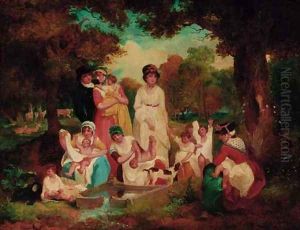Attibuted To Francis Wheatley Paintings
Francis Wheatley was an influential English painter, born in 1747 in London. His early life was marked by an ardent passion for art, leading him to study at the Royal Academy of Arts. Wheatley's artistic journey was diverse, as he dabbled in various subjects, including landscapes, portraits, and genre scenes, showcasing a remarkable versatility and adaptability in his artistic pursuits.
Wheatley's career took a significant turn in the 1770s when he spent several years in Ireland. This period was crucial for his development as an artist, as he produced a number of notable works that captured the beauty of the Irish landscape and the character of its people. His experiences in Ireland deepened his appreciation for rustic and pastoral themes, which would become recurrent motifs in his later works.
Upon his return to London, Wheatley continued to evolve as an artist. He became particularly renowned for his series of elegant and idyllic genre scenes, which were well-received by the public and critics alike. These works often depicted the English countryside and its inhabitants in a stylized, yet tender manner, reflecting Wheatley's refined sensibilities and his keen observation of rural life.
In 1791, Wheatley was elected as a Royal Academician, a testament to his contributions to the British art scene and his standing among his contemporaries. Despite facing financial difficulties throughout his life, Wheatley's artistic output remained prolific and varied. He was also involved in the production of engravings, collaborating with publishers to reproduce his paintings as prints, thereby reaching a wider audience.
Francis Wheatley passed away in 1801, leaving behind a rich legacy of work that continues to be celebrated for its elegance, charm, and portrayal of 18th-century English and Irish society. His art captures the spirit of his times, offering a window into the past through the lens of a sensitive and skilled observer. Wheatley's contribution to British art is commemorated in various collections and museums, ensuring that his legacy endures.
